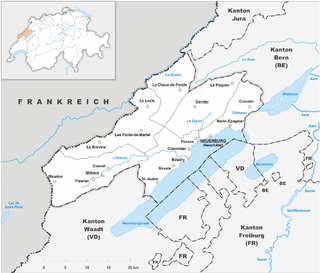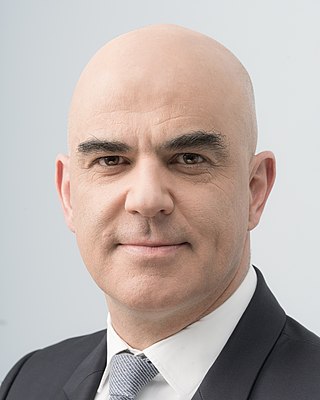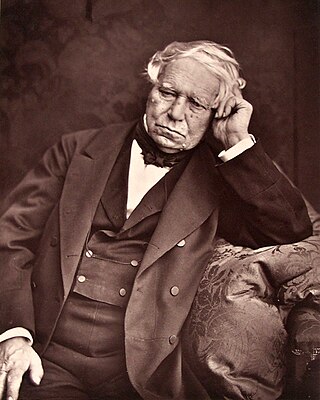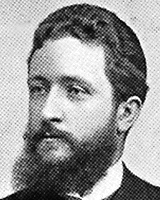
René Felber was a Swiss politician. He was a member of the Swiss Federal Council from 1987 to 1993. In 1992, he served as the President of Switzerland.

Johann Karl Emmanuel Schenk was a Swiss pastor, politician, and member of the Swiss Federal Council from 1863 until his death in 1895. Serving for 31 years and 218 days, he was the longest-serving member in the Federal Council. Later in life he became one of the first leaders of the Swiss Red Cross.

Jakob Dubs was a Swiss politician and member of the Swiss Federal Council (1861–1872). Along with Gustave Moynier and Guillaume-Henri Dufour, he founded the Swiss Red Cross in July 1866, and served as its first President until 1872.

Emil Johann Rudolf Frey was a Swiss politician, Union Army soldier in the American Civil War and member of the Swiss Federal Council (1890–1897). He served as President of the Swiss Confederation in 1894.

Numa Droz was a Swiss politician and member of the Swiss Federal Council (1875–1892). Born in La Chaux-de-Fonds, he was elected to cantonal government of Neuchâtel in 1871 and to the Swiss Council of States in 1872.
Frédéric-François-Louis Perrier was a Swiss politician and member of the Swiss Federal Council (1912–1913). As of 2009, he is the member with the shortest time in office.

Antoine Louis John Ruchonnet was a 19th-century Swiss attorney and politician. In 1864, he founded the Vaud Credit Union.

The Republic and Canton of Neuchâtel is a mostly French-speaking canton in western Switzerland. In 2007, its population was 169,782, of whom 39,654 were foreigners. The capital is Neuchâtel.

The Federal Department of Defence, Civil Protection and Sport is one of the seven departments of the Swiss federal government. It is headed by a member of the Swiss Federal Council, the Swiss defence minister.

Neuchâtel is a town, a municipality, and the capital of the Swiss canton of Neuchâtel on Lake Neuchâtel. Since the fusion in 2021 of the municipalities of Neuchâtel, Corcelles-Cormondrèche, Peseux, and Valangin, the city has approximately 33,000 inhabitants. The city is sometimes referred to historically by the German name Neuenburg; both the French and German names mean "New Castle".

The Federal Department of Environment, Transport, Energy and Communications is one of the seven departments of the Swiss federal government, headed by a member of the Swiss Federal Council.

Guillaume Henri Dufour was a Swiss military officer, structural engineer and topographer. He served under Napoleon I and held the Swiss office of General four times in his career, firstly in 1847 when he led the Swiss Confederation forces to victory against the Sonderbund. In 1864 Dufour presided over the First Geneva Convention which established the International Red Cross. He was founder and president of the Swiss Federal Office of Topography.

Alain Berset is a Swiss politician who served as a Member of the Swiss Federal Council from 2012 to 2023. A member of the Social Democratic Party (SP/PS), he headed the Federal Department of Home Affairs from when he took office. Berset served as President of the Swiss Confederation for 2018 and 2023.

Jules Armand Stanislas Dufaure was a French statesman who served 3 non-consecutive terms as Prime Minister of France.
Auguste Georges Adrien Cornaz was a Swiss politician and President of the Swiss Council of States (1881/1882).

Eugène Sémérie was a French doctor and writer involved with the positive movement.

Henri Barbet, or Henry Barbet, was a French industrialist and politician. He owned and ran the family cotton spinning and weaving factory in Rouen, one of the most important in the region. For many years he was mayor of Rouen. He was responsible for building two bridges over the Seine, and for a policy of putting the indigent and insane to work in charitable workshops. He was a deputy for the Seine during the July Monarchy and again during the Second French Empire.

Jérôme Frédéric Paul, baron David was the reputed illegitimate son of Jérôme Bonaparte. Throughout his life, he served France in a number of capacities such as politician and officer. He was also a journalist.

Jacques Marcel Lucet was a French advocate and politician. He was a committed Republican, supported the French Third Republic (1848–51), and was forced into exile during the Second French Empire, first in Italy and then in Algeria. During the French Third Republic he was deputy and then senator of the department of Constantine, Algeria, from 1871 to 1883.

















